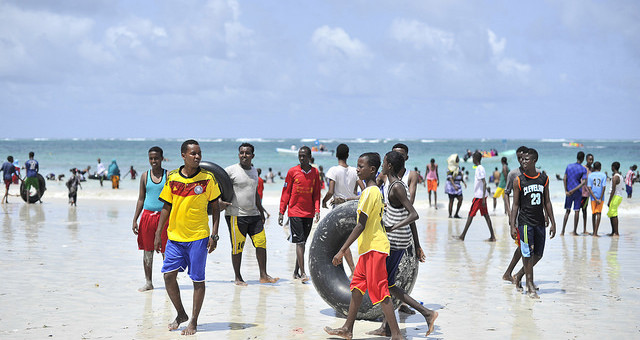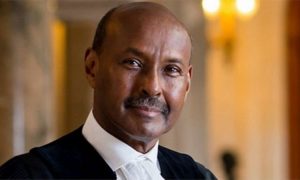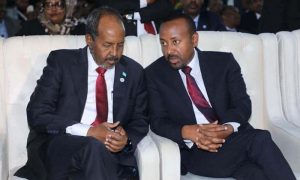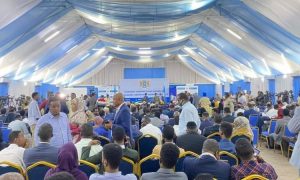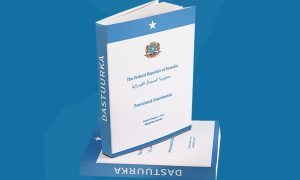
By Abdiwahab M. Ali
My visit to Mogadishu was initially conceived as a mission of sorts: curiosity to experiment what the future held for the capital, once paradise on earth, as it re-emerged from years of fratricidal civil war.
It all started with an invitation from Abdi, my close friend. “How come you not want to come to Mogadishu,” he inquired. “It is not such a bad place.”
Prior to my travel, I called my mom just as usual informing her about my trip to Mogadishu. However, her voice seemed different but she simply said “safe journey, Hooyo.” Her tone sounded neither worried nor excited. Call it confused or ambivalent.
On the flight, there was no one beside me for the first hour and I did what I normally do when traveling by plane: read a book.
Then a middle-aged man approached and sat next to me. He was lanky, with chipmunk-like cheeks; glasses hung from a chain and whispered, “Is it your first trip to Mogadishu?” I answered with simple but cautious “Yes,” wondering how he had discovered it was my first visit.
“Mogadishu is not the same place I knew,” he said, “It is totally changed.” The man assumed that, perhaps, I was a toddler when Mogadishu started changing and that I had barely seen the city in its heyday when it was peaceful. Interestingly, he came up with three essential survival rules for the newly arrived: Never tell anyone your true identity, never disclose your current address, and always be cautious.
Bored by his nuance words, I resumed my reading until the flight attendant announced that we are due to land shortly.
Renewed hope
The capital once a crown jewel of East Africa—a place sanctified with twinkling hotels, sandy beaches, perfect coastline, and palm trees perfectly lined, and such heaving, historical sites that made neighboring countries green with jealousy. However, after 23 years of brutal civil war, Mogadishu is slowly rising out of the ashes. Today, it is a tale of recovery, rebirth and bright future.
Travelling with Bajaj- three wheeled vehicle, I had the opportunity to observe Mogadishu closely.
Abdifatah, a skinny, barely 30-year-old Bajaj driver, took me around the city. Bajaj become my favorite mode of transport because it uses less petrol and maneuvers comfortably in narrower roads.
Abdifatah, a walking encyclopedia, had driven in many East and northern African cities before he finally settled in the Wardhiigley district. “There is no better than home,” he kept repeating.
While exploring Mogadishu, Abdifatah served as my guide in that intriguing city. Occasionally, he became excited and passionate about explaining things to me that he would take his hands off the steering wheel, endangering our lives.
Abdifatah was an expert on “Qudbo-sireed” (a secret marriage). He constantly boasted that he could win over any woman he wanted. “It is a God-given talent,” he would explain.
Again, Mogadishu is a place of many contrasts and contradictions. Mogadishu still shows the scars of the civil war: ruined homes, cracks in walls, missing roofs and patches of plaster.
But like many other things about Mogadishu, there is a sign of rapid, hesitant rebirth. The sounds of construction activities were everywhere and deafening:
On Thursdays, I visited Lido beach and it was always beautiful and special. Families and friends enjoyed the jovial atmosphere, some played football others would snap photos and instantly upload via Facebook/ Instagram. “The number of likes in your photo counts,” said a 17-year-old Ahmed.
“Yo, this is Lido, not Miami,” parked another guy with thick Californian accent.
Afternoon gatherings at Daljirka-Daahsoon monument were also unique experience. Hundreds of smartly dressed youth come together to take photos and watch traditional folk dances.
One day, I took an overcrowded bus to the point that half of my buttock was hanging out of the seat. A lady next to me felt thought I was little bit stressed. She leaned to my side and said, “Caadi-iska dhig” (Relax, man). I howled with laughter till my stomach hurt.
Booming nights
They say, Mogadishu is better at night than daytime. Lively night’s leave you shock in the evening, you will see a gaggle of youths wearing the latest fashion, walking along the Makkah al Mukaramah, the best and the most popular road in the city.
More bored young men, sitting in groups, sip juices while others watch cars go by. There are business centers, Internet cafes, and restaurants with out-door-serving. Mini- market signs saying, “We are open 24/7.” I wonder if they are actually open all the time.
It was the final play of the European Champion league, football fans watching Barcelona Vs Juventus at the Hodon district.
“Juventus will make history,” said a cheerful young man in white-Juventus jersey. “Barcelona is up,” contradicted another fan. The atmosphere was jammed with claps and noise.
Few meters away, we heard loud and pulsating music. It was an open-air restaurant full of young boys and girls. Every square kilometer was occupied by men, women: some smoked Hookah/Shiisha, others smoked cigarettes.
When a new song was turned, crowds would get up and dance. It was difficult to differentiate between the youth from the diaspora or the locals.
Security
One morning, I woke up quit late, forgetting that I was supposed to go to Jazeera Beach with some colleagues. When checked my phone, I saw numerous missed calls and text messages. The first one read, “Are you safe and sound?” The second one went, “I am worried about you; it is time to go to the beach”.
Such constant worries from friends showed the ever-present security threat in Mogadishu.
The encounter of the loquacious Bajaj driver Abdifatah, the kindness strangers like the lady in the over-crowded bus, the photo-addicted teens at Lido Beach, and the amusing waiters who mixed Somali with the few foreign words they knew, I found a city changing fast and furiously.
Abdiwahab M. Ali is a freelance writer and Researcher. Follow his twitter @Waberijr
_____________________________________________________________________________________
Xafiiska Wararka Qaranimo Online | Mogadishu, Somalia
_____________________________________________________________________________________Advertisement
_____________________________________________________________________________________


